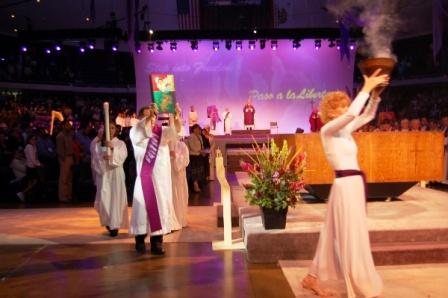It’s never the enemy OUTSIDE
the gates that brings your house crashing down. It’s lack of preparedness and
living in a state of denial that is the real problem.
And such is the state of
affairs today in large swaths of the Catholic world…
Voris points out that, judging by a lot of Catholic blogs and
websites, “you’d walk away with the impression that what ails the Church today
is Obama.” He adds:
One Catholic speaker is even
giving a presentation in the upcoming weeks called something like Catholic
surviving Obama. PLEASE! What a weird and meaningless topic. Catholics already
had their chance to survive Obama: it was called “election
night”. Too late. Fifty percent like him and voted for him. Case closed.
What Catholics need to survive
is the enemy within the gates.
Like the soft heresy that is
peddled non-stop because it’s rarely if ever challenged.
Like the near total lack of
understanding what the Church actually is.
Like the continual downward
spiral of Masses that look like little else than a warmed-over Protestant
service, replete with abuses and not to mention the misguided theological emphasis
at most of them.
Like the constant blurring of
the lines between the ordained clergy and the laity.
There is SO MUCH wrong in the
Church that CAN be corrected and simply isn’t because…the men charged with
correcting [the problems] refuse to [do so].
Why do they refuse to correct the problems? Voris has some
thoughts – watch the video or read the script to see what they are. I want to
focus on the part where he says
Listen to this communications
we received a day or so ago. It sums it up pretty well.
"I would like a frank discussion from CMTV on how the catastrophic
institutional failure of the Catholic Church before our very eyes since Vatican
II squares with it being the One True Church under the guidance and protection
of the Holy Spirit. Smiling at sodomy and officially-sponsored heresy like Fr.
John Crossin's (Director of the USCCB's Secretariat for Ecumenical and
Interreligious Affairs) “Generations of Faith” mini-Assisi earlier this month
in Washington, can't be shrugged off as a problem of dissident priests or
theologians. In his keynote speech to Moslems, Hindus, and Sikhs he said that
their conversation may lead Catholics to understand how their beliefs might be
wrong. It's all proudly on the USCCB's website. I have four kids in their 20s
who are struggling with the cognitive dissonance between the faith as carefully
handed down by their parents and the reality they are finding on their own.
I've lost one already, and it breaks my heart.”
Curious,
I went to the USCCB website and found several links (here,
here,
and here)
related to this. In fairness, I think we must acknowledge that Fr. Crossin did
not actually say that Catholics might be led “to understand how their beliefs
might be wrong”. At least, I can’t find
that statement. What he does say in the speech (and elsewhere) is this:
 “Our conversation may even lead
us to discover that we Catholics have been mistaken in our understanding of the
beliefs of the Catholic Church.”
“Our conversation may even lead
us to discover that we Catholics have been mistaken in our understanding of the
beliefs of the Catholic Church.”
That’s
a little different. Certainly, we can find many Catholics who are “mistaken” in
their understandings of the beliefs of the Church – like why the Church
teaches that artificial contraception is a moral evil, for instance. However,
Fr. Crossin does not explain any further or give an example to illustrate what
he means by his statement.
NONETHELESS…this
really takes nothing away from the point of this episode of the Vortex. If you
read the speeches at the link (Fr. Crossin gave “introductory remarks” and the
keynote address was given by Auxiliary
Bishop Barry Knestout), you will find a lot of “feel good” kind of talk. Well,
I suppose that’s what the conference was about, in essence: feeling good and
making inter-faith friends.
Maybe Fr. Crossin has made his own slight error in “understanding
the beliefs of the Catholic Church”. For
instance, he might gain something by reading Monsignor Charles Pope’s recent
blog post entitled “How
Ignoring Two Little Words Has Devastated Evangelization”. I recommend reading
the entire post, but I’ll cut to the chase as to what the two little words are.
Msgr. Pope says (emphasis in original):
What are these words? Simply
these:
“But often….”
Perhaps you are less than
amazed and wonder what they could have to do with evangelization, let
alone urgency. These words occur in a critical text of the Second Vatican
Council, Lumen Gentium # 16, which is often misunderstood to teach that
just about everyone will be saved, baptized or not. Yet these two little words
(“But often”) and the three sentences that follow set forth a critical
interpretive key that is often wholly ignored by many who hold an expansive and
universalist notion of salvation.
[He inserts a section from
paragraph 16 of Lumen Gentium]
Clearly, the text expansively
sets forth a case for God’s goodness and His desire to save all people. He
will regard the good will of those who, through invincible ignorance, do not
come to explicit confession of Jesus. And, presuming they are sincerely seeking
God and striving to live according to the dictates of conscience, God can
indeed save them.
But while such a scenario is
certainly possible, we ought not presume it is widespread, or
even necessarily common. And, the Lumen Gentium text does NOT in
fact presume that.
And this is where our two
little words are critical. For having set forth the possibility of
salvation apart from explicit confession of Jesus and baptism, the text then
states with proper and biblical sobriety:
BUT
OFTEN men, deceived by the Evil One, have become vain in their reasonings
and have exchanged the truth of God for a lie, serving the creature rather than
the Creator.
Msgr.
Pope's post includes a video of Dr. Ralph Martin commenting on this topic, and notes
that the post is a summary of “a central point [Dr. Martin] makes in his
important book: Will
Many Be Saved? What Vatican II Actually Teaches.”
Perhaps
I’m missing something. When we engage in “ecumenism”, does that mean we don’t preach the Gospel…you know, in
order to be “nice”? Or should “ecumenism” and “evangelization” go hand-in-hand?
Well, in the end, it’s all about salvation, right? I think we ought to be spreading
the word to Catholics and non-Catholics (and even non-Christians!) that there
is no salvation outside the Church. That IS what the Church teaches…isn’t it?
At any
rate, while I’m sure Msgr. Pope doesn’t want to be set up in opposition to the USCCB,
it certainly seems to me that he has a more authentic, Catholic view of the
topic of evangelization than the USCCB does!
Once
again, Michael Voris is right on target in the Vortex, as he concludes:
WHY WHY WHY won’t the bishops
and the Catholic media talk about the REAL problem and, most importantly, DO
SOMETHING about it – and stop, once and for all, talking about the economy and
immigration and fiscal policy. No one is listening.
…
Obama isn’t the problem. He’s
the proof and symptom of a Church membership and leadership that simply won’t
face the reality, and in so doing has lost its way.
Faithful Catholics have simply
got to step up and call it like it is.
Sometimes
it seems like an effort in futility to keep “stepping up and calling it like it
is”. But it is our duty.
And, of
course, don’t forget to pray and fast, and give your alms to a truly Catholic
cause.


















